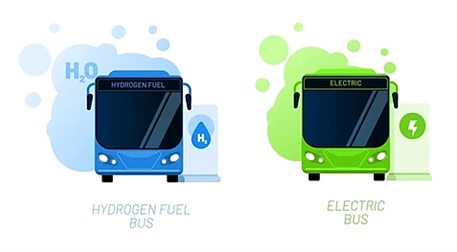Welcome to the sixth bulletin about the Metro Tasmania – Zero Emission Bus (ZEB) Trial. In this bulletin we provide answers to some common safety concerns regarding Battery Electric Buses (BEBs) and hydrogen powered Fuel Cell Electric Buses (FCEBs).
1. Are Battery Electric and Fuel Cell Electric Buses safe for Metro staff to operate and maintain and safe for passengers to travel on?
Ensuring safety is a key priority for Metro and for the Tasmanian Government who is providing the funding for the ZEB Trials.
The ZEBs that will be used in Metro Trials must meet strict regulatory and safety requirements. This will include compliance with relevant Australian Design Rules and other relevant Australian and International Standards, Codes and Regulations.
Bus operators involved with the ZEB Trials will receive comprehensive training to ensure the ZEBs are safely and efficiently operated.
Specialised maintenance will be carried out by the ZEB suppliers using appropriately qualified personnel. Metro maintenance staff will receive training to enable them to safely carry out ‘basic’ ZEB maintenance activities and to observe specialised maintenance activities. Metro’s maintenance facilities will also be assessed to ensure they are adequate for ensuring maintenance activities can be carried out safely.
While ZEBs are new for Tasmania, they have been safely operated in other parts of Australia and in other countries. Metro will develop educational material for the public to help address any safety concerns regarding travelling on ZEBs.
ZEBs are noticeably quieter than diesel buses, which can be a safety risk as pedestrians might not hear an approaching bus. To address this the ZEBs used in the Trials will make an artificial sound when approaching or departing bus stops to alert pedestrians and other road users.
2. Can batteries on Zero Emission Buses catch fire?
Fire incident research on electric vehicles (cars) indicates they are less likely to catch fire than internal combustion vehicles.1 The likelihood of fire in appropriately designed and operated batteries on ZEBs is very low. The Battery Electric Buses and Fuel Cell Electric Buses used in the Trials will be required to comply with fire mitigation and protection measures, which are focused on ensuring the safety of passengers, the public and Metro staff in the highly unlikely event of a battery fire incident.
The ZEB Trials will provide an opportunity for our first responder agencies, in particular the Tasmania Fire Service, to learn about these new technologies and how to respond in the unlikely event of an incident.
3. Isn’t hydrogen an explosive gas? How will safety be ensured?
Importantly, hydrogen has been used safely for many years across a range of applications. There are international, and an increasing number of national, standards, codes and regulations that relate specifically to the safe use of hydrogen in Fuel Cell Electric Buses and in Hydrogen Refueling Stations.
The Trials will need to meet the requirements of Tasmania’s gas safety regulator in the Department of Justice. This will include equipment supplier compliance with applicable standards, codes and regulations, and the development and implementation of comprehensive safety management plans, which will also be developed in consultation with the Tasmania Fire Service.
Importantly, the Trials will provide the opportunity for regulatory authorities to further improve the robustness of our regulatory and safety frameworks.

